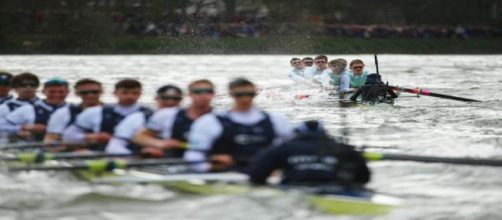The annual boat race between Cambridge and oxford universities hit issues when hours before the race an unexploded bomb was found near the start line by Putney Bridge. Organisers have since stated that the event will still take place. Police were called to the location after the device was spotted by passing sailor spotted the device.
The main event takes place at 5.35pm with the women’s race at 4.35pm, this year it is known as The Cancer Research Boat Race.
World War Two device
Due to the recent London attack, there were fresh concerns after the unexploded device was spotted.
However, the police have confirmed it was an old wartime bomb. Michelle Dite, Race Director, stated on Saturday that Any decisions regarding changes to the event will be made in conjunction with the police.”
It was approximately 1.50pm on Saturday that police were called by the passing sailor, with a Scotland Yard spokesperson confirming it being a World War Two bomb and saying that the Marine Policing Unit are currently assessing the submerged bomb. But they say that the event will still take place with thousands of people expected to line the banks of the Thames at the start line.
History of the race
The Boat Race is amongst one of the oldest sporting events in the world, with thousands expected to attend in London and millions watching on television.
The men’s race first took place in 1829, followed by the women’s almost 100 years later in 1927, this is set to be 163rd and 72nd editions respectively. With the race first beginning when two friends challenged each other to a race in or near London. The race first came about when Charles Wordsworth (nephew of the poet William Wordsworth), of Christ Church College, Oxford, and Charles Merrivale of St. John’s, Cambridge, met each other during a vacation in Cambridge.
Since then, the race has taken place each year with currently Cambridge out on top with 82 over Oxford’s 79, with 1 draw. In 1927 when the women’s race was first held, it was highly controversial for the era, it was originally held on the Isis in Oxford and held intermittently until the mid-1960s.
The Times have previously reported that ‘large and hostile’ crowds used to gather on the riverside to protest as men objected to women rowing. Currently, Cambridge lead Oxford 41 wins to 31.
2017 edition
The latest edition is the first year of it being known as The Cancer Research Uk Boat Race, will see Cambridge looking win again after they beat Oxford last year, stopping the previous 3-win streak by Oxford. Cambridge warmed up to the event by beating the Italian national crew, winning by two-and-a-half lengths. With Oxford as favourites to win this year to reduce Cambridge’s overall lead by 2 wins.
The route starts at Putney Bridge ending at Chiswick bridge, this is a four-and-a-quarter mile route.
The captains have coin toss to determine what station they will be at, with the Middlesex station being advantageous for the start and end of the race and the Surrey station advantageous for the middle part of the race. The crews are as follows:
Cambridge:
Ben Ruble (bow), 87.3 kg, Freddie Davidson, 81.9 kg, James Letten, 106.5 kg, Tim Tracey, 97.4 kg, Aleksander Malowany, 94.4 kg, Patrick Eble, 90.4 kg, Lance Tredell, 94.3 kg, Henry Meek (stroke), 95.4 k, Hugo Ramambason (cox), 55.3 kg
Oxford:
William Warr (bow), 94.2 kg, Matthew O’Leary, 74.8 kg, Oliver Cook, 91.7 kg, Joshua Bugajski, 99.2 kg, Olivier Siegelaar, 101.2 kg, Michael DiSanto, 89.9 kg, James Cook, 84 kg, Vassilis Ragoussis (stroke), 86.6 kg, Sam Collier (cox) 59.8 kg

